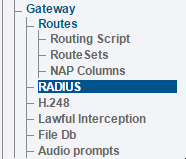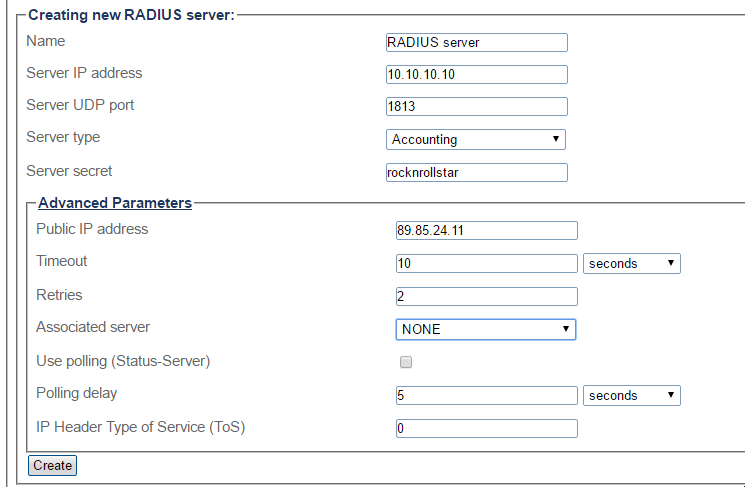Toolpack:Adding RADIUS server D
From TBwiki
(Difference between revisions)
m |
(Added parameters) |
||
| Line 85: | Line 85: | ||
</pre> | </pre> | ||
</div> | </div> | ||
| + | |||
| + | |||
| + | ==List of Parameters== | ||
| + | * [[Parameter: Name|Name]] | ||
| + | * [[Parameter: Server IP address|Server IP address]] | ||
| + | * [[Parameter: Server UDP port|Server UDP port]] | ||
| + | * [[Parameter: Server type|Server type]] | ||
| + | * [[Parameter: Server secret|Server secret]] | ||
| + | |||
| + | Advanced Parameters | ||
| + | * [[Parameter: Public IP address|Public IP address]] | ||
| + | * [[Parameter: Timeout|Timeout]] | ||
| + | * [[Parameter: Retries|Retries]] | ||
| + | * [[Parameter: Associated server|Associated server]] | ||
| + | * [[Parameter: Use polling (Status-Server)|Use polling (Status-Server)]] | ||
| + | * [[Parameter: Polling delay|Polling delay]] | ||
| + | * [[Parameter: IP Header Type of Service (ToS)|IP Header Type of Service (ToS)]] | ||
Revision as of 18:05, 24 November 2016
Applies to version(s): v2.9, v2.10
These instructions are used to add a RADIUS accounting server or a RADIUS authorization server target to the configuration.
Call Detail Records (CDR) or Call authorization requests will be sent to these servers.
Multiple RADIUS servers can be configured to provide RADIUS redundancy.
1- Select RADIUS from the navigation panel.
2- In the Editing RADIUS client configuration page, select Create new RADIUS server
3- Configure the RADIUS server with these parameters:
- Name to recognize the server.
- Server IP address is the IP address of the RADIUS server we want to access.
- Server UDP Port is the UDP port of the RADIUS server we want to access (default port is 1813 for accounting and 1812 for authorization/authentication)
- Server type is Accounting for CDR and Authorization for Authorization and Authentication.
- Server secret is the passphrase to authenticate the TMG on the RADIUS server.
In Advanced Parameters:
- Public IP address is used if the TMG is behind a NAT
- Timeout is the request timeout in milliseconds for each request to this server.
- Retries is the number of retries the RADIUS client will try before falling back to other methods. See full details on functionality here: CDR redundancy
4- You can configure multiple RADIUS servers to provide redundancy protection for RADIUS servers. Each entry can have different settings.
Path
/configurations/@[configuration_name]/radius_servers/@[radius_server]
Parameters (text)
/configurations/@[configuration_name]/radius_servers/@[radius_server] ip_address = "@[address_number]" name = "@[radius_server]" port = @[port_number] secret = "@[secret]" type = "Accounting" /configurations/@[configuration_name]/radius_servers/@[radius_server]/advanced_parameters associated_authorization_server = "" ip_header_tos = 0 polling_delay = "5 seconds" polling_enabled = false public_ip_address = "" retries = 2 timeout = "10 seconds"
Parameters (json)
{
"advanced_parameters" : {
"associated_authorization_server" : "",
"ip_header_tos" : 0,
"polling_delay" : "5 seconds",
"polling_enabled" : false,
"public_ip_address" : "",
"retries" : 2,
"timeout" : "10 seconds"
},
"ip_address" : "@[address_number]",
"name" : "@[radius_server]",
"port" : @[port_number],
"secret" : "@[secret]",
"type" : "Accounting"
}
List of Parameters
Advanced Parameters



